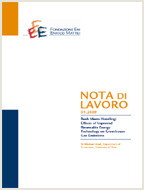Why do Firms Hold Oil Stockpiles?

Data
28.12.2011
28.12.2011
Autori
Charles F. Mason
Codice JEL
Q2, D8, L15
Q2, D8, L15
Parole chiave:
Petroleum Economics, Stochastic Dynamic Optimization
Petroleum Economics, Stochastic Dynamic Optimization
Publisher
Energy: Resources and Markets
Energy: Resources and Markets
Editor
Giuseppe Sammarco
Giuseppe Sammarco
Persistent and significant privately-held stockpiles of crude oil have long been an important empirical regularity in the United States. Such stockpiles would not rationally be held in a traditional Hotelling-style model. How then can the existence of these inventories be explained? In the presence of sufficiently stochastic prices, oil extracting firms have an incentive to hold inventories to smooth production over time. An alternative explanation is related to a speculative motive – firms hold stockpiles intending to cash in on periods of particularly high prices. I argue that empirical evidence supports the former but not the latter explanation.
